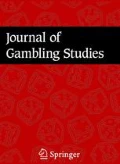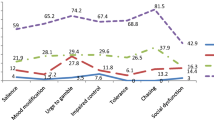Abstract
Data from two studies are used to examine the proposition that excessive gambling, unlike excessive substance use, is not generally viewed as a form of dependence. In the first study, the attitudes of 100 members of the general population towards the causes of excess and towards appropriate treatments, indicated that excessive gambling was seen in more moral terms than were other addictive behaviours. In the second study, of 54 people receiving treatment for one of four forms of excessive behaviour, gamblers were just as likely to use terms such as ‘addiction’ or ‘compulsion’ to describe their behaviour but were also more likely than others to describe it in terms of moral weakness or vice. Concern is expressed at the way in which gambling may be marginalized as a form of dependence.
Similar content being viewed by others
References
Biernacki, P. (1986).Pathways from heroin addiction: Recovery without treatment. Temple University Press, Philadelphia.
British Medical Journal (1968). Compulsive gambler. Leading article, 13th April 1968,69.
Halliday, J. and Fuller, P. (Eds.) (1974).The psychology of gambling. Harper and Row, New York.
Heather, N. and Robertson, I. (1986).Alcohol problems: The new approach. Harmondsworth: Penguin.
McCartney, J. (1986).Perceptions of addiction and change. Unpub. PhD thesis, University of Exeter, U.K.
Orford, J. (1985).Excessive appetites: A psychological view of addictions. Wiley: Chichester.
Prochaska, J. and DiClemente, C. (1986). Towards a comprehensive model of change. In Miller, W. and Heather, N. (Eds.)Treating addictive behaviors: Processes of change. Plenum, New York.
Solomon, R. (1980). The opponent-process theory of acquired motivation.American Psychologist, 35, 691–712.
Stewart, J., deWit, H. and Eikelboom, R. (1984). Role of unconditioned and conditioned drug effects in the self-administration of opiates and stimulants.Psychological Review, 91, 251–68.
Stockwell, T., Murphy, D. and Hodgson, R. (1983). The Severity of Alcohol Dependence Questionnaire: Its use, reliability and validity.British Journal of Addiction, 78, 145–155.
Author information
Authors and Affiliations
Additional information
We would like to acknowledge the help and support of the members of the clinical and general population samples who generously gave their time to take part in this research, and of those who kindly gave us permission to approach people in the clinical sample with whom they were in touch. We are grateful also to the Social Science Research Council (now the Economic and Social Research Council) who supported J.M. during the period of the research.
Rights and permissions
About this article
Cite this article
Orford, J., McCartney, J. Is excessive gambling seen as a form of dependence? Evidence from the community and the clinic. J Gambling Stud 6, 139–152 (1990). https://doi.org/10.1007/BF01013494
Issue Date:
DOI: https://doi.org/10.1007/BF01013494




